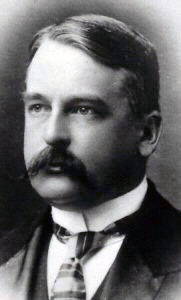Elliott Lewis
Sir Neil Elliott Lewis KCMG (born October 27, 1858 in Hobart , Tasmania , † September 22, 1935 ibid) was a politician of the Anti Socialist Party (ASP), the Commonwealth Liberal Party (CLP) and the Nationalist Party of Australia , the between Was Prime Minister of Tasmania three times in 1899 and 1903, 1909 and 1909 to 1912 .
Life
Member of Parliament, opposition leader and Prime Minister 1899-1903
Lewis first completed an undergraduate degree , which he completed with a Master of Arts (MA). A subsequent postgraduate studies of law at the University of Oxford closed it with a Bachelor of Civil Law (BCL), and was then as a lawyer working.
One year after his return, Lewis was elected for the first time on July 26, 1886 in the constituency of Richmond as a member of the House of Representatives (Tasmanian House of Assembly) , the lower house of the Tasmanian parliament, and was initially a member until his resignation in April 1903. While he was a member of parliament, he became the Conservative opposition leader in May 1894 and held this position until November 1897.
On October 12, 1899, Lewis succeeded Edward Braddon as Prime Minister of Tasmania for the first time and held that office until he was succeeded by the Liberal William Propsting on April 8, 1903. During his tenure, he also took on the position of Attorney General. . For his political merits he was beaten in 1902 to Knight Commander of the Order of St. Michael and St. George (KCMG) and from then on carried the suffix "Sir".
After leaving parliament, he resumed his practice as a lawyer.
Prime Minister 1909
In the elections of April 30, 1909, Lewis was re-elected as a candidate of the Anti Socialist Party to a member of the House of Assembly and represented Denison's constituency until June 10, 1922 .
On June 19, 1909, he succeeded John William Evans for the second time Prime Minister after Evans had resigned. The reason for the resignation was the successful performance of the Australian Labor Party in the elections of April 30, 1909: Although the Anti Socialist Party still had an absolute majority with 24,779 votes (50.61 percent) and 17 of the 30 seats in parliament, it lost five seats to John Earle's Labor Party , which received 19,067 votes (38.94 percent) and now had twelve seats in parliament. In his cabinet, Lewis also took over the office of Treasurer .
Subsequently, however, a faction of liberals within the Anti Socialist Party undermined the leadership of Lewis, which ultimately led to a vote of no confidence in Lewis on October 20, 1909 .
Then the Governor of Tasmania , Harry Barron , appointed John Earle to form the government. On October 20, 1909, he formed a minority government as Prime Minister, making it the first Tasmanian government to be formed by the Labor Party. Lewis took over the office of opposition leader of the Commonwealth Liberal Party (CLP), which emerged from the Anti Socialist Party.
A week later, however, Earle was deposed on October 27, 1909 by a new vote of no confidence in the House of Assembly.
Prime Minister 1909 to 1912
As a result, Lewis became Prime Minister of Tasmania for the third time on October 27, 1909, and took over the post of Treasury Secretary again in his government.
In the April 30, 1912 election, Prime Minister Lewis’s Commonwealth Liberal Party got 40,252 votes (54.48 percent) and 16 seats, while Earles Labor Party received 33,634 votes (45.52 percent) and 14 seats. Despite the election victory, there was internal criticism of Lewis, whereupon Lewis resigned on June 14, 1912 and Albert Solomon , the previous attorney general, education and mining minister, became the new prime minister.
After a few years as a backbencher , Lewis was reappointed to the state government by Prime Minister Walter Lee as Treasury Secretary on April 15, 1916 , and served in that office until March 31, 1922. He also served in Lee's cabinet from April 15, 1916 to June 28, 1922 also as Minister for Mines and was last from April 1 to June 22, 1922 also chief secretary of the cabinet.
Lewis, who had been a member of the Nationalist Party of Australia since 1919, declined to run again in the general election on June 10, 1922, resigned from the House of Assembly and withdrew from political life.
Web links
- Entry on the homepage of the Parliament of Tasmania
- Ministers - House of Assembly - 1856 to 1950
| personal data | |
|---|---|
| SURNAME | Lewis, Elliott |
| ALTERNATIVE NAMES | Lewis, Neil Elliott (full name) |
| BRIEF DESCRIPTION | Australian politician |
| DATE OF BIRTH | October 27, 1858 |
| PLACE OF BIRTH | Hobart , Tasmania |
| DATE OF DEATH | September 22, 1935 |
| Place of death | Hobart , Tasmania |
